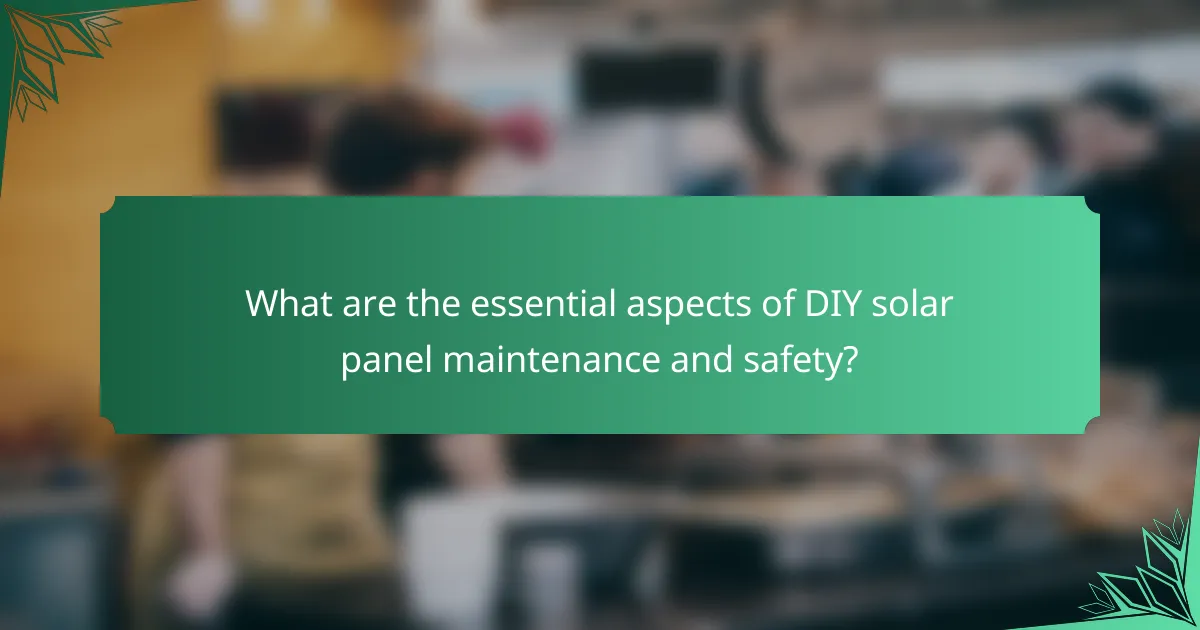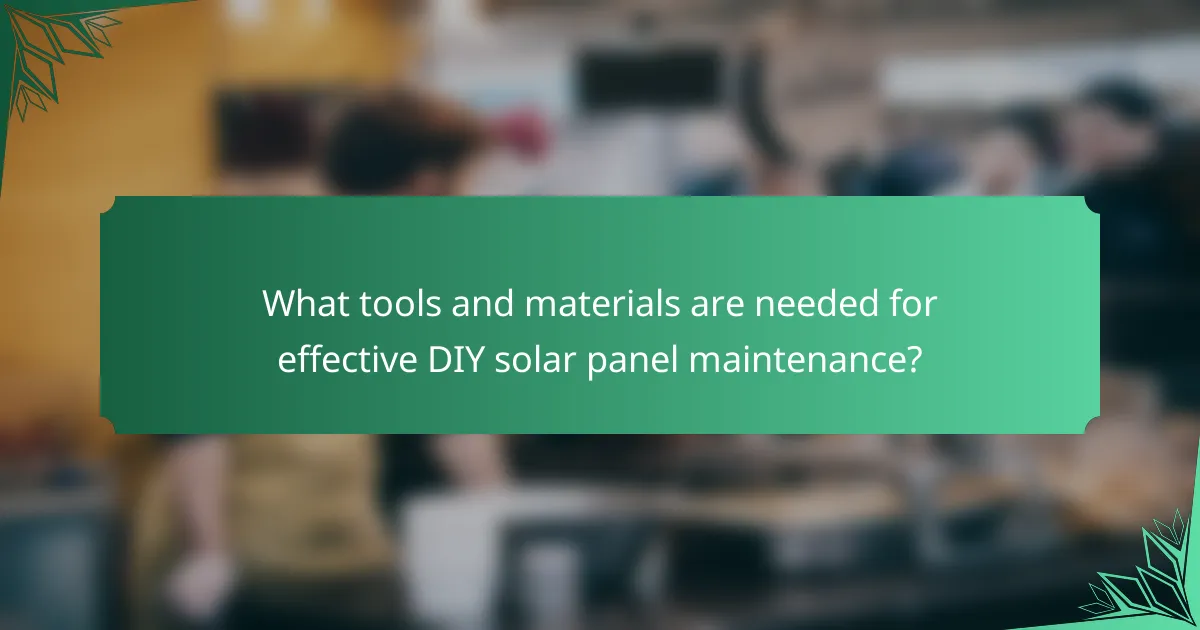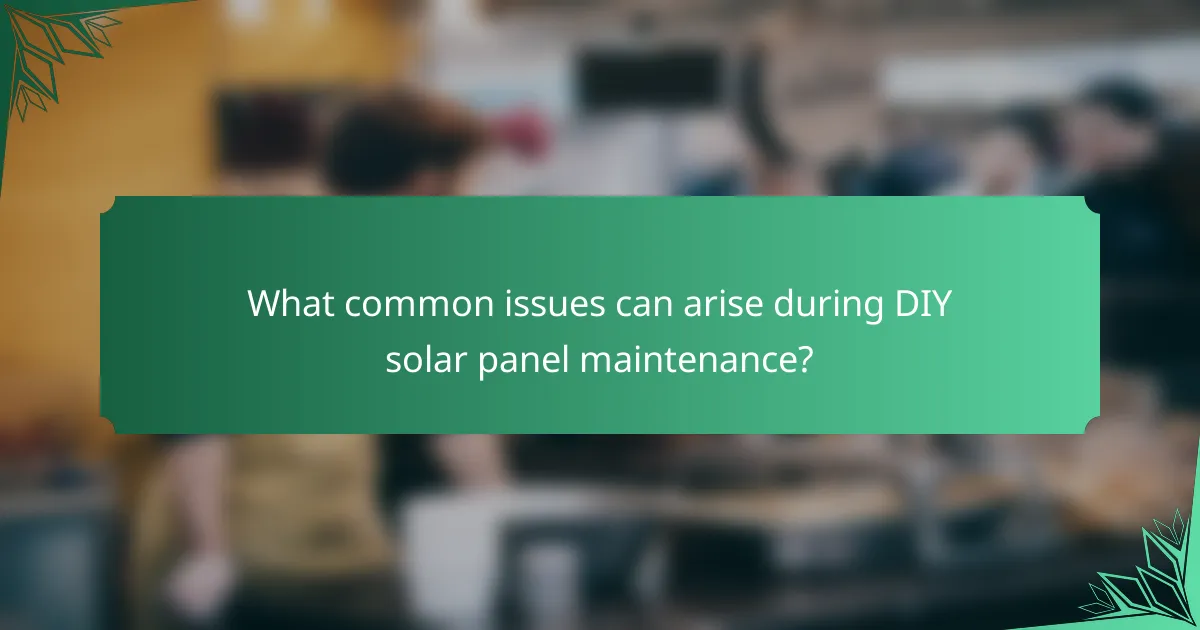
What are the essential aspects of DIY solar panel maintenance and safety?
Essential aspects of DIY solar panel maintenance include regular cleaning, inspection, and monitoring. Cleaning panels ensures optimal performance by removing dirt and debris. Inspections should check for physical damage, loose connections, and wear. Monitoring energy output helps identify issues early. Safety measures involve turning off the system before maintenance. Using proper tools and protective gear is crucial to prevent accidents. Following manufacturer guidelines enhances safety and efficiency. Regular maintenance can extend the lifespan of solar panels, ensuring reliable energy production.
How can regular maintenance improve the efficiency of solar panels?
Regular maintenance can significantly improve the efficiency of solar panels. This process includes cleaning, inspecting, and servicing the panels. Dust, dirt, and debris can accumulate on the surface, blocking sunlight. Studies show that a clean solar panel can produce up to 25% more energy than a dirty one. Regular inspections can identify issues like cracks or shading from nearby objects. Early detection of such problems allows for timely repairs, preventing further efficiency loss. Additionally, checking connections and inverters ensures optimal performance. By maintaining solar panels, owners can maximize their energy output and investment returns.
What specific maintenance tasks should be performed regularly?
Regular maintenance tasks for solar panels include cleaning the panels, inspecting for damage, and checking connections. Cleaning panels removes dirt and debris that can reduce efficiency. Inspecting for damage involves looking for cracks or signs of wear. Checking connections ensures that all electrical components are secure and functioning properly. These tasks can enhance the performance and longevity of the solar panel system. Regular maintenance is recommended at least twice a year, according to industry standards.
How often should maintenance checks be conducted?
Maintenance checks for solar panels should be conducted at least twice a year. Regular inspections help identify dirt, debris, or damage that may affect performance. Seasonal changes can impact the efficiency of solar panels. Therefore, checking them before and after winter and summer is recommended. Additionally, if the area experiences severe weather, checks should be performed afterward. This frequency aligns with industry best practices for maintaining optimal solar panel functionality. Regular maintenance can enhance energy production and prolong the system’s lifespan.
What safety precautions should be taken during DIY solar panel maintenance?
Always wear personal protective equipment (PPE) during DIY solar panel maintenance. This includes safety goggles, gloves, and hard hats. Ensure the solar panels are turned off before starting any maintenance. Disconnect the inverter and the circuit breaker to prevent electrical shock. Use insulated tools to reduce the risk of electrical accidents. Avoid working on solar panels during wet or windy conditions. This minimizes the risk of slips and falls. Always work with a partner when performing maintenance tasks. This ensures assistance in case of an emergency. Follow the manufacturer’s guidelines for specific safety recommendations. Adhering to these precautions significantly reduces the risk of injury.
What personal protective equipment (PPE) is necessary for solar panel maintenance?
Personal protective equipment (PPE) necessary for solar panel maintenance includes safety glasses, gloves, and hard hats. Safety glasses protect the eyes from debris and UV rays. Gloves provide hand protection against electrical hazards and sharp edges. Hard hats safeguard the head from falling objects, especially when working at heights. Additional PPE may include non-slip footwear to prevent falls and harnesses for fall protection when on rooftops. These items are crucial for ensuring safety during maintenance tasks.
How can electrical hazards be mitigated while working on solar panels?
Electrical hazards can be mitigated while working on solar panels through proper safety protocols. Always disconnect the solar panels from the electrical system before maintenance. Use insulated tools to prevent accidental electrical contact. Wear personal protective equipment such as gloves and safety glasses. Ensure the work area is dry to reduce the risk of electric shock. Regularly inspect wiring and connections for damage to avoid short circuits. Follow manufacturer guidelines for installation and maintenance to ensure compliance with safety standards. Training on electrical safety for all personnel involved is essential.

What tools and materials are needed for effective DIY solar panel maintenance?
To effectively maintain DIY solar panels, several tools and materials are essential. A soft-bristle brush is needed to gently remove dirt and debris from the panel surface. A squeegee helps to clear water after rinsing the panels. A bucket is necessary for mixing cleaning solutions or rinsing tools. Mild soap or a specialized solar panel cleaner ensures safe cleaning without damaging the panels. A garden hose with a spray nozzle provides a gentle water flow for rinsing. Safety goggles protect the eyes during maintenance, while gloves safeguard the hands. A ladder may be required for accessing elevated panels. Regular maintenance can enhance efficiency by up to 20%, according to the U.S. Department of Energy.
What are the must-have tools for solar panel maintenance?
The must-have tools for solar panel maintenance include a soft brush, a hose, and a multimeter. A soft brush helps remove dirt and debris without scratching the panels. A hose provides a gentle water flow to rinse off contaminants. A multimeter is essential for checking the electrical output and performance of the solar panels. Additionally, safety gear such as gloves and goggles is important to protect the user during maintenance. Regular maintenance with these tools ensures optimal performance and longevity of solar panels.
How do different tools contribute to the effectiveness of maintenance tasks?
Different tools enhance the effectiveness of maintenance tasks by improving efficiency and precision. Tools such as multimeters enable accurate voltage and current measurements. This allows for quick identification of electrical issues in solar panels. Cleaning equipment, like soft brushes and non-abrasive cleaners, ensures the panels remain free of debris. Regular cleaning increases energy production by up to 20% according to the National Renewable Energy Laboratory. Safety tools, including gloves and goggles, protect users during maintenance tasks. Proper tools reduce the risk of accidents and ensure compliance with safety standards. Overall, using the right tools streamlines the maintenance process and prolongs the lifespan of solar panels.
What materials should be kept on hand for repairs and cleaning?
For repairs and cleaning of solar panels, essential materials include a soft brush, squeegee, and microfiber cloth. A soft brush helps remove debris without scratching the panel surface. A squeegee is effective for removing excess water after rinsing. Microfiber cloths are ideal for gentle cleaning to prevent scratches. Additionally, a bucket for soapy water and a hose for rinsing are useful. Having these materials on hand ensures efficient maintenance and prolongs the lifespan of solar panels. Regular cleaning can improve energy efficiency by up to 20%, according to industry studies.
How can I ensure my solar panel system is safe and compliant with regulations?
To ensure your solar panel system is safe and compliant with regulations, follow local codes and standards. Research the National Electrical Code (NEC) and local building codes applicable to solar installations. Obtain necessary permits before installation to comply with local regulations. Hire a licensed electrician to inspect the system for safety and compliance. Use certified solar panels and equipment to meet industry standards. Regularly maintain the system to ensure ongoing compliance with safety protocols. Document all installations and inspections for future reference and compliance verification.
What regulations should I be aware of when maintaining solar panels?
Regulations for maintaining solar panels include local building codes and safety standards. These regulations ensure safe installation and operation of solar systems. Many states require permits for solar panel installation and maintenance. Compliance with the National Electrical Code (NEC) is often necessary. Utility companies may have specific interconnection standards. Environmental regulations may also apply, especially regarding waste disposal. Regular inspections may be mandated by local authorities. Adhering to these regulations helps avoid fines and ensures system efficiency.
How can I check if my solar panel installation meets safety standards?
To check if your solar panel installation meets safety standards, first verify compliance with local building codes. These codes outline specific requirements for solar installations. Next, ensure that the installation is done by a certified professional. Certification indicates knowledge of safety protocols. Additionally, check that all components are UL-listed or certified by a recognized testing laboratory. This certification ensures that the equipment meets safety standards. Regular inspections by qualified personnel can identify potential safety issues. Documentation from these inspections can provide proof of compliance. Finally, consult the National Electrical Code (NEC) for guidelines specific to solar panel installations. Following these steps will help ensure your installation meets safety standards.

What common issues can arise during DIY solar panel maintenance?
Common issues during DIY solar panel maintenance include electrical hazards, physical damage, and improper cleaning techniques. Electrical hazards can occur if the system is not de-energized before maintenance. This can lead to shocks or short circuits. Physical damage may happen if panels are not handled carefully. Dropping or scratching the panels can reduce their efficiency. Improper cleaning techniques can lead to scratches or damage to the panel surface. Using abrasive materials can also void warranties. Additionally, failing to check for debris or shading can reduce energy output. Regular inspections are essential to identify and resolve these issues early.
What are the signs that solar panels need immediate attention?
Signs that solar panels need immediate attention include visible damage, such as cracks or broken glass. Additionally, a significant drop in energy production indicates a malfunction. Dirty panels can also affect performance, but severe dirt buildup may require professional cleaning. Unusual noises from the inverter suggest electrical issues that need addressing. Lastly, frequent tripping of circuit breakers can signal underlying problems with the system. Regular monitoring can help identify these issues early.
How can I identify performance issues in my solar panel system?
To identify performance issues in your solar panel system, regularly monitor energy output. Compare the current output to historical data. A significant drop in energy production indicates a potential issue. Check for physical obstructions like dirt, leaves, or snow on the panels. Inspect the inverter for error codes or warning lights. Ensure all electrical connections are secure and free from corrosion. Additionally, consider performing thermal imaging to detect hot spots on the panels. Regular maintenance and inspections can prevent long-term performance declines.
What troubleshooting steps should I take for common solar panel problems?
Check for shading on solar panels. Obstructions can reduce efficiency. Inspect connections for corrosion or damage. Ensure all wiring is secure. Clean panels to remove dirt and debris. Monitor inverter lights for error indications. Test the system voltage with a multimeter. Compare readings to manufacturer specifications. If issues persist, consult a professional.
What best practices should I follow for DIY solar panel maintenance and safety?
Regularly inspect solar panels for dirt and debris. Clean them with a soft brush or sponge and mild soap. Ensure the panels are powered off before cleaning. Check for any signs of damage, such as cracks or loose connections. Use safety gear like gloves and goggles when handling panels. Ensure proper grounding to prevent electrical hazards. Follow manufacturer guidelines for maintenance and safety practices. Research indicates that regular maintenance can increase solar panel efficiency by up to 20%.
How can I create a maintenance schedule for my solar panels?
To create a maintenance schedule for your solar panels, start by determining key maintenance tasks. Regular cleaning is essential to remove dirt and debris. Check the panels for any visible damage monthly. Inspect the inverter and wiring connections every three months. Schedule a professional inspection annually to assess performance and efficiency. Document each task with dates and observations for tracking. This structured approach ensures optimal performance and longevity of your solar panels. Regular maintenance can increase energy output by up to 20%, according to a study by the National Renewable Energy Laboratory.
What tips can enhance the longevity and safety of my solar panel system?
Regular cleaning of solar panels enhances their longevity and safety. Dirt and debris can block sunlight, reducing efficiency. Cleaning should be done with soft materials to avoid scratches. Inspecting the panels for any cracks or damage is crucial. Damaged panels can lead to safety hazards or reduced performance. Ensure that the mounting system is secure to prevent physical damage during storms. Monitoring the system’s performance helps in identifying issues early. Professional inspections every few years can provide additional safety assurance. Following these tips can significantly extend the lifespan and safety of a solar panel system.
The main entity of the article is DIY solar panel maintenance and safety. This article provides essential information on maintaining solar panels, including regular cleaning, inspection, and monitoring to enhance efficiency and prolong lifespan. It emphasizes safety precautions during maintenance, such as using personal protective equipment and following manufacturer guidelines. Key topics include necessary tools for maintenance, common issues that may arise, and best practices for ensuring safety and compliance with regulations. The article aims to equip readers with practical tips for effective DIY solar panel upkeep.